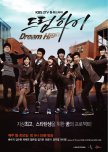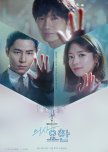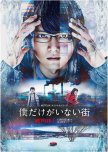
A Refreshing Dive into Teen Romance
"Our Secret Diary" is an emotional rollercoaster that begins with a bit of a shaky start with too much music and an initial awkwardness in acting. However, once it hits its stride, it becomes a compelling journey. The characters feel remarkably genuine, breaking away from the cookie-cutter molds often seen in these films. The absence of prolonged tearful scenes and sudden villains is a welcome surprise, making the high school romance feel more authentic. The imperfect yet honest portrayal of the main character adds a layer of realism, and the evolution of the initially shy heroine is a standout aspect. Despite being rooted in the familiar, the film manages to keep viewers engaged for almost two hours, turning a basic romance into a captivating movie night experience.Cet avis était-il utile?

The Killer's Shopping Mall
4 personnes ont trouvé cette critique utile
Cette critique peut contenir des spoilers
Unveiling Shadows: Deciphering the Intrigues of 'A Shop for Killers
A Shop for Killers," a gripping Korean drama released on Disney+ on January 17, 2024, emerges as a noteworthy addition to the platform's original content in South Korea. Adapted from Kang Ji-Young's acclaimed novel, the series is directed by Lee Kwon and No Kyu-Yeob, with a screenplay crafted by Lee Kwon and Ji Ho-Jin. At its core, the narrative revolves around college student Jeong Ji-An, portrayed by the talented Kim Hye-Jun, thrust into a perilous world of assassins and secrets following her uncle's mysterious demise.Episode 1-2: A Prelude to Intrigue
The inaugural episodes lay the groundwork for the series, introducing viewers to Jeong Ji-An's tumultuous journey. We witness her abrupt confrontation with skilled assassins, propelling her into a realm of danger and uncertainty. However, the decision to curtail action sequences raises questions, potentially hindering the immersive experience for some viewers. Moreover, the narrative's sporadic editing may disrupt the flow, necessitating further observation as the story unfolds. Despite these minor setbacks, the portrayal of advanced drone technology adds a layer of authenticity to the storyline, enhancing its allure.
Episode 3-4: Escalating Tensions
As the plot thickens, Ji-An finds herself embroiled in a labyrinth of deceit and treachery. The narrative delves deeper into her uncle's enigmatic past, unraveling layers of intrigue and suspense. However, the erratic editing persists, occasionally detracting from the episode's impact. Nevertheless, the series maintains its grip on the audience, delivering captivating performances and pulse-pounding action sequences.
Episode 5-6: The Battle Intensifies
In the midst of escalating conflict, Ji-An confronts formidable adversaries, testing her resolve and resilience. The episodes offer a glimpse into the character's growth and development, culminating in riveting showdowns and unexpected revelations. Despite occasional lapses in coherence, the series captivates with its intense narrative and compelling character dynamics.
Episode 7-8: The Final Confrontation
As the series reaches its climax, Ji-An's fate hangs in the balance, her courage tested like never before. The concluding episodes deliver a satisfying resolution to the central conflict, albeit with lingering questions and unresolved plot threads. While the series falls short of perfection, it succeeds in delivering a thrilling and emotionally resonant narrative that leaves a lasting impression on viewers.
Analyzing the Military Aspects
Throughout the series, the portrayal of military equipment and tactics adds depth to the storyline, lending an air of authenticity to the action sequences. However, certain discrepancies, such as the portrayal of drone technology and firearm handling, may raise eyebrows among more discerning viewers. Despite these minor inconsistencies, the series effectively integrates military elements into its narrative, enhancing its overall realism and impact.
Exploring Character Dynamics
Central to the series' success are its well-developed characters and their intricate relationships. Ji-An's journey of self-discovery and resilience forms the heart of the narrative, complemented by compelling supporting characters like Jeong Jin-Man and Min-Hui. Each character brings a unique perspective to the story, enriching the viewing experience and elevating the series beyond mere action-thriller tropes.
Conclusion: A Compelling Thriller
In conclusion, "A Shop for Killers" emerges as a captivating and enthralling drama that combines elements of mystery, suspense, and action with compelling character dynamics. While not without its flaws, the series succeeds in delivering a riveting narrative that keeps viewers on the edge of their seats from start to finish. As the credits roll on the first season, viewers are left eagerly anticipating what lies ahead for Ji-An and her allies in Season 2.
Cet avis était-il utile?

Cette critique peut contenir des spoilers
Escape of the Seven: A Promising Journey Derailed
Escape of the Seven had such a promising start that had me hooked from the beginning. The story kicked off with a captivating premise, full of mystery and intriguing characters. I was really excited about where the series was heading. However, as the show reached its final act, it started to lose its edge and left me feeling disappointed.In the beginning, I was really drawn to the concept of a group of strangers being tricked into their detailed downfall. Each character had unique skills and it made for a really interesting dynamic. The challenges and puzzles they faced were cleverly designed and kept me on the edge of my seat, eagerly waiting to see what happened next.
But unfortunately, as the story got closer to its conclusion, things started to unravel. The plot that was once so meticulously crafted became messy and rushed. The character arcs, which had a lot of potential, were left unresolved and felt abandoned. The backstories that added depth to the narrative were brushed aside and didn’t receive the attention they deserved.
What bothered me the most about the ending was the feeling that the creators were more interested in setting up a possible second season rather than focusing on creating a satisfying ending for the first. The intricate storytelling that had me so captivated in the beginning was replaced by rushed resolutions and forced plot twists. It left me with a lot of unanswered questions and loose ends.
I think it’s great when shows leave room for future seasons, but it’s important that each season can stand on its own. Unfortunately, Escape of the Seven seemed to prioritize future storylines over delivering a strong, conclusive ending to the first season.
All in all, Escape of the Seven had an exciting start that had so much potential. I was hooked by the fascinating premise and the intriguing characters. But in the end, the rushed and contrived finale left a lot to be desired. It felt like a missed opportunity, as if the creators were more interested in setting up future seasons rather than delivering a satisfying conclusion. It’s disappointing, because I truly believe this show had the potential to be something truly captivating.
Cet avis était-il utile?

IU’s Phenomenal Character Transformation and Mesmerizing Vocals Take Center Stage
Dream High, an extraordinary Korean drama series, captivates viewers with its heartfelt storyline and outstanding performances. Among the talented cast, IU stands out with her remarkable character transformation, inspiring weight loss journey, and jaw-dropping singing ability. This drama is an absolute must-watch for fans eager to witness IU’s awe-inspiring talent.IU’s character transformation in Dream High is truly something to behold. As she navigates the challenges faced by aspiring entertainers, her growth and development are evident, drawing viewers in with each stride she takes towards her dreams. IU’s portrayal of her character is so genuine and captivating that you can’t help but root for her success and share in her triumphs.
Moreover, IU’s weight loss journey throughout the series is a testament to her dedication and hard work. As her character evolves, so does her physical appearance, showcasing her commitment to embodying her role authentically. Her transformation becomes an inspiration, reminding us that anything is possible with perseverance and a strong will.
But it is IU’s musical prowess that truly sets her apart. Her singing abilities are nothing short of breathtaking, mesmerizing audiences with her rich and powerful vocals. Each performance is a testament to her incredible talent and hard-earned skills. IU’s songs in Dream High evoke deep emotion and resonate with the audience, leaving an indelible impression.
Her ability to convey complex emotions through her singing is truly remarkable. In every note she hits, you can feel the raw passion and vulnerability that she brings to her character’s journey. IU’s exceptional vocal range and control elevate the drama’s musical performances to another level, ensuring that each song becomes a standout moment.
The dedication and effort that IU puts into her music shine brilliantly in Dream High. She effortlessly carries the weight of the drama with her mesmerizing stage presence, leaving viewers in awe. Her songs become the heart and soul of the series, evoking a gamut of emotions with every melody.
While IU’s character transformation and weight loss are commendable, it is her incredible singing that takes center stage in Dream High. Her talent, honed through years of hard work, elevates the drama to another level, creating unforgettable moments that leave a lasting impact on viewers.
In conclusion, Dream High is an exceptional drama that showcases IU’s multifaceted talent. Her character transformation and weight loss journey are testaments to her dedication and commitment to her craft. However, it is her phenomenal singing that truly steals the show. IU’s powerful vocals and emotional performances make Dream High a must-watch, leaving you in awe of her incredible talent and longing for more of her mesmerizing music.
Cet avis était-il utile?

Experience the Bone-Chilling Terror of ‘Death Forest’: A Haunting Journey Into Darkness
“Death Forest” is a bone-chilling Japanese movie that takes you on a suspenseful and eerie journey through a haunted forest. Directed by a master of horror, this film skillfully combines stunning cinematography, haunting sound design, and a gripping storyline to create a truly unsettling experience that will keep you on the edge of your seat.The story revolves around a group of close friends who bravely venture into the infamous Aokigahara Forest. This forest has gained a dark reputation as a site for suicides, and our characters are soon confronted with inexplicable phenomena and malevolent spirits that shake their sanity to the core.
One of the things that makes “Death Forest” so effective is its ability to create an overwhelming sense of fear and tension. The dense foliage, the deafening silence interrupted only by eerie sounds, and the constant anticipation of what lurks behind each tree combine to create an oppressive atmosphere that seeps into your bones. As the encounters with the supernatural escalate, the movie steadily builds suspense, leading to terrifying moments that will have you jumping out of your seat.
The actors’ performances in this film are remarkable, as they expertly convey both the fear and vulnerability their characters experience in the face of the unknown. You can feel their desperation and watch as their minds unravel in the face of such terror.
If you’re a fan of horror movies and are up for a thrilling and spine-chilling experience, “Death Forest” is a must-watch. With its haunting visuals, captivating storyline, and unforgettable scares, this Japanese movie will leave you with a sense of unease long after the credits roll.
Cet avis était-il utile?

Cette critique peut contenir des spoilers
The Intricate Tapestry of Life and Death in 'Death’s Game
"Death’s Game" unfolds as a tapestry of intricate lives and destinies, drawing audiences into a captivating narrative propelled by a stellar cast and a plot rich with complexity and depth. The story commences with Choi Yee-Jae, a character whose life, marked by seven years of unemployment, takes a dark turn as he contemplates ending his own existence. Little does he know that this decision will propel him into a realm of new possibilities and challenges beyond the threshold of death.The initial episodes of the series meticulously delve into Yee-Jae's life, chronicling the adversities that lead him to the edge of despair. From failed job interviews to financial scams resulting in bankruptcy, a heartbreaking breakup, and eviction due to unpaid rent, the sequence of misfortunes becomes the catalyst for his tragic decision to leap from a building.
The ensemble cast is a highlight of "Death’s Game," each character contributing to the complexity of the narrative. One such character is Park Jin-Tae, the 33-year-old second son of the Taekang Group’s owner. His victory in a fierce competition against his brother positions him as the representative of the group in the afterlife. The intriguing concept of Yee-Jae’s "death game" emerges, aligning with the idea of a parallel timeline where the original person is long gone, and Yee-Jae, upon 'respawning,' strives to evade his own death. This brings forth the stark reality that his first life is marked by his demise.
The series takes an adrenaline-filled turn with Song Jae-Seob, a 38-year-old extreme sports enthusiast holding four Guinness World Records. Yee-Jae's entry into Jae-Seob's life during a mid-air respawn introduces a daring challenge—a no-parachute skydive with the tantalizing reward of 3 billion won from a sponsor. However, the pursuit of riches leads to Yee-Jae's fatal crash. The intricate twist lies in the realization that, despite inheriting the person’s memories and abilities, Yee-Jae fearlessly dives into danger, sealing his fate in the second life.
Kwon Hyeok-Su, a 17-year-old student facing relentless bullying, becomes the vessel for Yee-Jae's consciousness in the third life. The struggle against tormentors takes a tragic turn, leaving Yee-Jae beaten and ultimately killed with a brick. The cyclical nature of Yee-Jae's deaths unfolds, each life revealing the complexities and challenges of the characters he inhabits.
Lee Ju-Hun, a 35-year-old fixer involved in shady dealings, enters the narrative as Yee-Jae’s journey continues. His theft of 10 billion won for a woman sets off a chain of events that lead to a relentless pursuit by his boss’s men. Yee-Jae's successful escape, characteristic of a Korean hitman, ends abruptly as he is killed by the woman upon revealing the money's location. The series masterfully weaves the threads of Yee-Jae's successive lives, each marked by unique challenges and resolutions.
Jo Tae-Sang, a 21-year-old aspiring fighter, steps into Yee-Jae's shoes in the fifth life. Taking the blame for a hit-and-run in exchange for 200 million won lands him in jail, where he confronts Lee Jin-Sang, the killer of Kwon Hyeok-Su from the third life. Yee-Jae's quest for justice takes a tragic turn as he is stabbed by the hit-and-run victim’s father and killed by a fellow inmate over the money. The intricate dance of fate and consequence unfolds, shaping the narrative with each successive life.
The introduction of Jang Seung-Jo, a 24-year-old model with ambiguous aspirations, adds a layer of complexity to the storyline. His involvement in retrieving money from a subway station connects him with Park Tae-Woo, the Taekang Group’s representative. Yee-Jae's vague recognition of Tae-Woo sets the stage for a series of events that intertwine the lives of these characters.
The narrative takes an emotional turn as Yee-Jae, working at a café in his next life, encounters his ex-girlfriend Lee Ji-Su. The revelation that the money she gave him was from a novel prize and the man driving her home was her brother leads to a poignant reflection on Yee-Jae's ignorance and insecurities. As he shares his death experiences with Ji-Su, a tragic incident unfolds when Park Tae-Woo, once again drunk driving, collides with them. Ji-Su meets instant death, while Yee-Jae succumbs to Tae-Woo's actions. The seventh life ends in tragedy, setting the stage for a deeper exploration of Yee-Jae's motivations and the intricacies of the interconnected lives.
The narrative takes a deliberate turn as Park Tae-Woo, through cleverly linked deaths, emerges as a pivotal character. His role in hiring killers for Jin-Tae, paying for Tae-Sang’s hit-and-run cover-up, and perpetuating deaths through drunk driving becomes a central plot device. Yee-Jae's resolve to avenge Ji-Su gains momentum, propelling the storyline into a web of vengeance, morality, and interconnected destinies.
The revelation that Yee-Jae's suicide from the building inadvertently caused another person's death raises questions about the morality of his actions. The crushed victim, alongside a doll that hints at a pregnant woman, adds a layer of complexity to Yee-Jae's punishment—experiencing various deaths linked to these events, particularly involving Park Tae-Woo. Ji-Su's death becomes Yee-Jae's sole remaining reason to live, fueling his determination to avenge her at any cost.
The introduction of Zheng Jue Zhe, a 33-year-old artist with a unique talent, introduces a darker aspect to the narrative. Witnessing a horrifying scene, Zheng channels his inspiration into a painting hailed internationally for its portrayal of human cruelty. Yee-Jae's intention to use Zheng's body for revenge against Park Tae-Woo sets the stage for a calculated confrontation. Knocking Tae-Woo unconscious and taking him home, Yee-Jae's plans take an unexpected turn as Zheng falls into a coma due to a brain tumor.
The tables turn as Zheng wakes up tied to a surgical table by Park Tae-Woo. Yee-Jae's plans to dismember Tae-Woo end in a painful death for Zheng, marking the eighth life. However, Zheng's death is revealed as a calculated sacrifice, with the artist recording the entire murder process in anticipation of his demise at Tae-Woo's hands. The abrupt end of Kim Jae-Wook’s role, killed by Park Tae-Woo in one episode, unravels the intricacies of Yee-Jae's connection to Tae-Woo's actions throughout multiple lifetimes.
Ahn Ji-Hyeong, a 42-year-old detective with aspirations to follow in his father's brave footsteps, emerges as a key player in the unfolding drama. His mother's illness, stemming from the fear that he might share his father's fate, adds a layer of complexity to his character. Ji-Hyeong's internal struggle, compounded by the disdain from colleagues for prioritizing his safety, transforms him into a disheartened detective.
The loss of Ji-Hyeong's mother becomes a turning point, with cold stares from colleagues exacerbating his disheartenment. The acceptance of his changed character, shaped
not by intentions but actions, sets the stage for Ji-Hyeong's unexpected role in resolving the intricate web of interconnected lives. His journey becomes pivotal as he goes to Zheng Jue Zhe’s house, retrieves video evidence, and attempts to expose Park Tae-Woo's crimes.
Tae-Woo's cunning manipulation, turning to the police and claiming he was kidnapped while fighting Zheng, adds layers of suspense and complexity to the narrative. Ahn Ji-Hyeong's calculated moves, utilizing memories from many lives, introduces a thrilling dimension as he plants a bomb on a plane, pilots it with Tae-Woo aboard, and parachutes before Tae-Woo awakens. The intricate dance of revenge unfolds as Ahn waits on the ground, intending to run Tae-Woo over with a car.
Yee-Jae's initial plan to kill Tae-Woo takes an unexpected turn as he recalls Ji-Su's words while seeing a pen on the ground. The narrative takes a poignant twist as Ahn, in a final confrontation with Tae-Woo, witnesses a gust of wind causing Tae-Woo, entangled in a parachute, to collide with a speeding truck. Tae-Woo's saga concludes with severe injuries, rendering him a vegetative patient.
Ahn's visit to the lawyer in prison, eating the memory card in front of him, seals Tae-Woo's fate, dashing any hopes of exoneration. Ahn's heroic demise in a confrontation with a criminal marks the end of the ninth life, adding layers of depth to the exploration of justice, revenge, and the consequences of one's actions.
The narrative takes a poignant turn as Yee-Jae, reincarnated as a homeless person, attends Ahn Ji-Hyeong’s funeral. An encounter with the junior he saved on the stairs turns bitter as the junior questions Yee-Jae's identity and right to speak. The profound realization dawns on Yee-Jae as he contemplates the truth in the Death God’s words—living as someone else, regardless of the duration, is ultimately meaningless.
The homeless man's memories flood into Yee-Jae's consciousness, prompting him to run down the stairs and fall to his death. The tenth life concludes with a tragic yet contemplative note, emphasizing the transient and fragile nature of borrowed identities.
Reincarnated once more, Yee-Jae returns to the origin of everything, inhabiting the body of the person hit by Park Tae-Woo, affecting his initial interview. However, Yee-Jae's surrender or reluctance to change becomes evident as he is struck by Tae-Woo at the same time and place, startling his past self en route to the interview. The eleventh life ends in a poignant reflection on the potential for change and the inevitability of certain outcomes.
In the final reincarnation, Yee-Jae faces his greatest test—reincarnating as his own mother. This transformation allows him to understand her struggles, her bravery, and the sacrifices she made in raising him. Climbing a mountain with her memories, Yee-Jae faces a perilous fall off a cliff. In other lives, he might have given up the will to live, but in his mother’s body, he strives to survive. The narrative takes a poignant turn as Yee-Jae wakes up in a hospital, having grasped life’s profound lesson.
The twelfth life unfolds as Yee-Jae tenderly cares for his mother’s body until her natural death, 32 years later. This life becomes a culmination of the lessons learned, a testament to the transformative power of empathy and understanding. The exploration of life, identity, and the intricate interplay of choices reaches its zenith in this final reincarnation.
Returning to the Death God, Yee-Jae kneels and pleads for another chance to live in his own body. The Death God, acknowledging Yee-Jae’s victory over her, grants him a last chance with a bullet in a revolver. Yee-Jae pulls the trigger and finds himself back before his suicide attempt. The story concludes on a profound note as Yee-Jae takes the call from his mother instead of jumping, symbolizing a rebirth and a newfound appreciation for life.
In conclusion, "Death’s Game" stands as a masterpiece of storytelling, intricately weaving together diverse characters, complex plotlines, and profound themes. The series explores the fragility of life, the consequences of choices, and the transformative power of empathy. Choi Yee-Jae's journey through multiple lives, each intricately connected to the actions of Park Tae-Woo, offers a riveting exploration of morality, justice, and the pursuit of meaning. The narrative's depth, emotional resonance, and thought-provoking twists make "Death’s Game" a timeless and compelling work of fiction that lingers in the minds of its audience long after the final credits roll.
Cet avis était-il utile?

The Sound of Magic: A Captivating Journey into Enchantment and Resilience
"The Sound of Magic" is undeniably a gem of 2022, rekindling my belief in magic with its enchanting narrative. Choi Sung-eun's portrayal of Yoon Ah-yi is a masterpiece, navigating life's struggles with a raw vulnerability that tugs at the heartstrings. Ji Chang-wook, in the role of Lee Yeul, adds a mysterious charm, becoming a guiding force for Ah-yi and amplifying the series' allure.What sets this series apart is its seamless fusion of fantasy and reality. Each episode unfolds as a captivating journey through a world where magic is more than a mere plot device; it becomes a profound metaphor for conquering the challenges life throws our way. "The Sound of Magic" expertly weaves whimsy with the harsh truths of existence, creating a narrative that resonates deeply.
In just six episodes, the series crafts a poignant tale of loneliness, resilience, and the indomitable human spirit. Ah-yi's world, burdened by her father's debt and relentless bullying, serves as the poignant backdrop for a story where hope triumphs over adversity. The series skillfully navigates between the fantastical and the tangible, proving that even in the darkest moments, a glimmer of light can emerge.
The supporting cast, especially Hwang In-youp as Il-deung, contributes layers to the narrative. Il-deung's character, teetering on the edge of collapse under societal expectations, adds complexity to Ah-yi's story. The series unfolds like a spellbinding tapestry, seamlessly combining drama, humor, and camp to create a viewing experience unlike any other.
Ji Chang-wook's portrayal of Lee Yeul steals the spotlight, his charismatic and mysterious presence adding an extra layer of intrigue. As his dark past is gradually unveiled, the emotional rollercoaster intensifies, contributing to the series' perfect blend of heavy subjects and fairytale beauty.
"The Sound of Magic" is more than a show; it's a transformative journey. Amidst dramatic musical numbers and stunning production, it remains grounded in the complexities of life. Sung-eun's nuanced portrayal and Chang-wook's charismatic performance breathe life into the characters, making them resonate deeply.
Reflecting on "The Sound of Magic," I am compelled to give it a resounding 10 out of 10. This series isn't just entertainment; it's a poignant reminder of the magic that exists in ordinary moments. In a world that often forgets the extraordinary, "The Sound of Magic" reignites the belief that magic is alive and well.
This series stands as a testament to the transformative power of storytelling. It has not only secured its place as a personal favorite for its narrative brilliance but has also played a pivotal role in making me rediscover the magic within and around me.
Cet avis était-il utile?

Cette critique peut contenir des spoilers
A Heartwarming Journey of Redemption
18 Again is a remarkable Korean drama that takes viewers on an emotional rollercoaster ride, exploring themes of self-discovery, second chances, and the power of family. The story revolves around Hong Dae Young, a middle-aged man who wakes up one day to find himself transformed into his 18-year-old self.The plot immediately captures attention with its unique premise, setting the stage for a nostalgic and heartfelt journey. As Dae Young navigates the challenges of high school once again, viewers witness his struggle to balance his youthful energy with his responsibilities as a husband and father. This premise not only provides moments of humor and lightheartedness but also creates a rich canvas for exploring deep emotional connections.
The performances in 18 Again are truly exceptional, with each actor delivering a standout portrayal of their respective characters. Yoon Sang-hyun brings a perfect blend of vulnerability and maturity to the role of Dae Young, effortlessly transitioning between the older and younger versions of the character. Lee Do-hyun shines as the teenage Dae Young, captivating audiences with his authentic portrayal of youthful exuberance. Kim Ha-neul delivers a compelling performance as Jung Da-jung, powerfully conveying the complexities of her character’s journey with grace and authenticity.
What sets 18 Again apart is its exploration of universal themes that resonate deeply with viewers. The drama delves into the idea of regret and the desire for a second chance, prompting reflection on one’s own life choices. Through Dae Young’s journey, the series encourages viewers to seize opportunities, chase their dreams, and find redemption even in the face of past mistakes. Additionally, the importance of family bonds and forgiveness is beautifully emphasized, reminding audiences of the enduring strength and power of love.
The character development in 18 Again is truly remarkable, with each character undergoing growth and transformation. Dae Young’s children, his high school friends, and those he encounters along the way add layer upon layer of depth to the story. Through their personal struggles, viewers gain valuable insights into societal issues such as bullying and teenage relationships, fostering empathy and understanding.
Visually, 18 Again excels with its stunning cinematography. The vibrant colors and well-composed shots effectively convey the emotions and nuances of each scene, enhancing the overall viewing experience. The well-curated soundtrack further elevates the storytelling, punctuating poignant moments and evoking a range of emotions.
This is a remarkable Korean drama that captivates viewers with its unique premise, outstanding performances, and heartfelt storytelling. It delves into universal themes, leaving a lasting impression on viewers long after the final episode. With its powerful
Cet avis était-il utile?

Doctor X Season 2: A Riveting and Unconventional Medical Drama
Get ready for another heart-pounding season of “Doctor X” as it returns with Season 2, bringing even more intensity, intrigue, and captivating storytelling to the small screen. Building upon the success of its predecessor, this Japanese drama series continues to captivate audiences with its unique premise and unforgettable characters.Season 2 of “Doctor X” follows the bold and unconventional surgeon Michiko Daimon (played by the brilliant Ryoko Yonekura) as she faces a fresh set of medical challenges that push her skills and beliefs to new extremes. Drawing from the labyrinthine world of the healthcare system, the drama explores the complexities of medical ethics and the ever-evolving dynamics between doctors and institutions.
What makes Season 2 truly exceptional is the combination of stellar performances and engrossing storytelling. Ryoko Yonekura effortlessly brings Michiko Daimon’s character to life, showcasing her unwavering determination and rebellious spirit. Her magnetic charisma keeps viewers hooked, rooting for her as she navigates through a series of dramatic medical cases.
The writing continues to impress, expertly blending moments of high-stakes suspense with thought-provoking themes. Each episode presents a new medical challenge that taps into Michiko’s unorthodox methods and showcases her exceptional skills as a surgeon.
Furthermore, Season 2 delves deeper into the flaws of the healthcare system, shedding light on the moral dilemmas faced by doctors. It encourages viewers to question the balance between corporate intent and patient care, sparking introspection about the true purpose of medical professionals.
Visually, Season 2 maintains the high production standards of the series, with stunning cinematography and meticulously designed medical settings. The attention to detail creates an immersive experience that enhances the authenticity of each episode.
In conclusion, “Doctor X” Season 2 is a must-watch for fans of medical dramas and those seeking a unique and compelling story. With its superb performances, gripping narrative, and thought-provoking exploration of medical ethics, Season 2 keeps viewers on the edge of their seats, eagerly anticipating each thrilling episode.
Cet avis était-il utile?

Doctor X: Embark on an Unconventional and Thrilling Medical Journey
Prepare to be captivated by “Doctor X,” a Japanese drama series that takes you on an extraordinary and thrilling ride into the world of medicine. Led by the remarkable surgeon Michiko Daimon, portrayed brilliantly by Ryoko Yonekura, Season 1 of Doctor X offers a unique and unforgettable experience that will leave you wanting more.What sets Doctor X apart from other medical dramas is its refreshing and unconventional approach. Instead of a typical hospital setting, we follow the audacious Michiko Daimon, known as “Doctor X,” as she becomes a freelance surgeon, traveling to different medical institutions to tackle seemingly impossible cases. This fresh premise, combined with Michiko’s unorthodox methods and unwavering determination, creates a sense of excitement and unpredictability that keeps you hooked.
Ryoko Yonekura’s portrayal of Michiko Daimon is simply mesmerizing. She effortlessly brings out the character’s strength, vulnerability, and rebellious spirit, making Michiko an unforgettable and relatable figure. Yonekura’s performance is a true highlight, commanding the screen with her undeniable talent and captivating presence.
The writing in Doctor X is top-notch, striking a perfect balance between medical intricacies, character development, and moments of suspense. Each episode presents a new medical challenge that showcases Michiko’s incredible skills and instinctive intuition. The series also delves into the personal lives of supporting characters, adding depth and further engaging viewers in the story.
Visually, Doctor X is visually stunning, with beautifully shot surgical scenes and meticulously designed medical sets. The attention to detail adds authenticity and immerses you in the high-pressure world of medicine, heightening the intensity of each episode.
Furthermore, Doctor X goes beyond being just a medical drama. It offers thought-provoking commentary on the flaws within the healthcare system and the ethical dilemmas that doctors confront. It sparks contemplation about the balance between medical advancement and personal egos, forcing us to question what truly defines a healer.
In summary, Doctor X Season 1 is a must-watch for fans of Japanese dramas and those seeking a medical story that breaks the mold. With its captivating protagonist, stellar performances, engaging narrative, and thought-provoking themes, Doctor X delivers a thrilling and unforgettable experience that will keep you eagerly anticipating the next episode.
Cet avis était-il utile?

Cette critique peut contenir des spoilers
Doctor John is an emotionally charged and captivating Korean drama that flawlessly blends the medical genre with intriguing mysteries and complex characters. Ji Sung delivers a brilliant performance as Cha Yo-han, a gifted anesthesiologist with the unique ability to read his patients’ pain. Teaming up with Lee Se-young, who portrays the intelligent and determined resident Kang Shi-young, they navigate through challenging medical cases and unravel the truth behind each patient’s ailment.One of the standout qualities of Doctor John is its engrossing storytelling. The writing explores not only medical ethics but also delves into the depths of the human psyche, making each episode thought-provoking and enthralling. The medical cases brilliantly capture the emotional and psychological aspects of the patients, presenting a multi-dimensional portrayal of healthcare professionals and their intricate connection with their patients.
Moreover, the chemistry between Ji Sung and Lee Se-young is palpable, adding an extra layer of depth to the narrative. Their characters form a captivating duo on-screen, grappling with personal dilemmas and unearthing past traumas. The exceptional performances of both actors breathe life into their characters, amplifying the intensity and making their journey all the more compelling.
Doctor John also fearlessly addresses important societal issues such as addiction, mental health, and the shortcomings of the healthcare system. By shedding light on the challenges faced by both doctors and patients, the drama emphasizes the significance of empathy and understanding in delivering proper medical care.
Visually, Doctor John is a treat for the eyes, featuring aesthetically pleasing cinematography and realistic portrayals of medical procedures. The medical setting is convincingly depicted, allowing viewers to immerse themselves in the world of the characters and enhancing the engagement with the medical cases.
In conclusion, Doctor John is a must-watch drama for enthusiasts of the medical genre and those seeking complex characters and intricate storylines. It strikes a perfect balance between medical mysteries and emotional depth, leaving audiences both entertained and enlightened. With its impressive performances, skillful storytelling, and thought-provoking themes, Doctor John stands out as a Korean drama that should not be missed.
Cet avis était-il utile?

Boku dake ga Inai Machi
0 personnes ont trouvé cette critique utile
Step into a Time-Traveling Thriller: The Live-Action Adaptation of ‘Erased’
The live-action adaptation of “Erased” is a captivating and emotionally charged ride that successfully brings the beloved manga and anime to life. This Japanese drama follows the story of Satoru Fujinuma (portrayed by Tatsuya Fujiwara), a struggling manga artist who possesses the ability to travel back in time to prevent tragic events. With his powers, Satoru tries to solve a series of child kidnappings from his past while evading danger in the present.One of the standout aspects of the live-action adaptation is its faithfulness to the source material. The direction and production capture the essence of “Erased” beautifully, staying true to the intriguing storyline, complex characters, and emotional depth of the original work. The pacing is tight, keeping viewers hooked with its suspenseful twists and turns.
Tatsuya Fujiwara delivers a commendable performance as Satoru, effectively portraying the character’s vulnerability, determination, and growth throughout the series. The supporting cast also shines, adding depth and authenticity to the story.
Visually, “Erased” is stunning, with impressive cinematography that captures both the nostalgic atmosphere of the past and the intensity of the present. The production design flawlessly recreates the settings, enhancing the immersion into Satoru’s world.
Furthermore, the live-action adaptation manages to maintain the introspective and thought-provoking themes of the original work. It explores topics such as regret, redemption, and the significance of human connections, leaving viewers contemplating the complexities of life and the value of second chances.
Overall, the live-action adaptation of “Erased” successfully captures the essence and spirit of its source material. With its compelling storyline, strong performances, and viscerally engaging visuals, this Japanese drama is a must-watch for fans of the original manga or anime, as well as those seeking an enthralling and emotionally charged viewing experience.
Cet avis était-il utile?

Cette critique peut contenir des spoilers
A Captivating Journey into the Depths of Emotion
Doona is an extraordinary Korean drama that thoroughly engulfs viewers in a captivating journey, brimming with raw emotions, intricate characters, and a thought-provoking storyline. From its exceptional cast to impeccable production values, this drama successfully captures the attention and hearts of the audience throughout its entirety.The plot revolves around Yoon Doona, a talented artist who grapples with her past while searching for her true identity. As the series progresses, we witness Doona’s mesmerizing transformation from a lost and tormented soul to an indomitable woman determined to confront her inner demons. Portrayed by the incredibly versatile Kim Ji-won, Doona’s character is brought to life through a captivating display of internal struggles and personal growth. Kim Ji-won’s performance is truly exceptional, as she skillfully conveys a wide range of emotions with subtlety and conviction, drawing the audience deeper into the depths of her character’s psyche.
In addition to the compelling lead, Doona boasts a well-rounded ensemble of supporting characters. These characters, including Doona’s friends, family, and love interests, are meticulously developed, adding depth and complexity to the narrative. Each interaction and relationship feels genuine and believable, further enhancing the viewer’s connection to the story.
The production value of Doona is nothing short of outstanding. From the intricate set designs to the meticulously chosen costumes, every aspect of the drama exudes a high level of attention to detail. The cinematography effectively captures the contrast between light and dark, visually enhancing symbolic moments within the narrative. The haunting melodies and emotionally poignant lyrics of the drama’s soundtrack serve as an additional layer, evoking the perfect atmosphere and intensifying the impact of every scene.
Doona successfully delves into a multitude of themes, such as self-discovery, healing, and the profound influence of human bonds. Through its non-linear and unpredictable storytelling approach, the drama keeps viewers on the edge of their seats, eagerly anticipating each revelation and plot development. The carefully crafted episodes not only entertain but also leave a lasting impact, encouraging introspection and eliciting deep emotional responses from the audience.
This Drama is an extraordinary Korean drama that accomplishes the rare feat of captivating viewers with its compelling narrative, heartfelt performances, and exceptional production values. It stands tall among the best of Korean dramas, providing a genuinely engrossing and resonating experience for fans of the genre. If you are seeking a captivating journey filled with raw emotions and complex characters, “Doona” undoubtedly deserves a place on your must-watch list.
Cet avis était-il utile?









